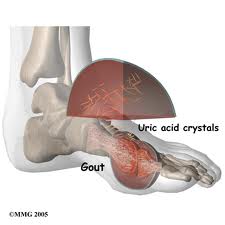 Though the risk of gout is low in women, a new study reported in JAMA found that increasing intake of sugar-sweetened soda was associated with an increasing risk of gout. Women who consumed 1 serving per day (compared to women who had less than 1 serving per month) had a a 74% increased risk of gout. Women who consumed 2 or more servings had a 2.4 times higher risk. The same result was not found in women drinking diet soft drinks. However, a single serving of orange juice per day also demonstrated an increased risk.
Though the risk of gout is low in women, a new study reported in JAMA found that increasing intake of sugar-sweetened soda was associated with an increasing risk of gout. Women who consumed 1 serving per day (compared to women who had less than 1 serving per month) had a a 74% increased risk of gout. Women who consumed 2 or more servings had a 2.4 times higher risk. The same result was not found in women drinking diet soft drinks. However, a single serving of orange juice per day also demonstrated an increased risk.
Fructose rich drinks increase serum uric acid levels, a trigger for gout, though the prospective data on the relationship are limited.
The researchers analyzed 78,906 women with no history of gout from the U.S. Nurses' Health Study. They identified newly diagnosed cases of gout in 778 of the women.
Gout is a painful inflammatory type of arthritis. 5% of arthritis cases are gout. In the U.S. 8.5/1000 people have had gout. Gout affects men more than women.

 In a new meta-analysis published in the
In a new meta-analysis published in the